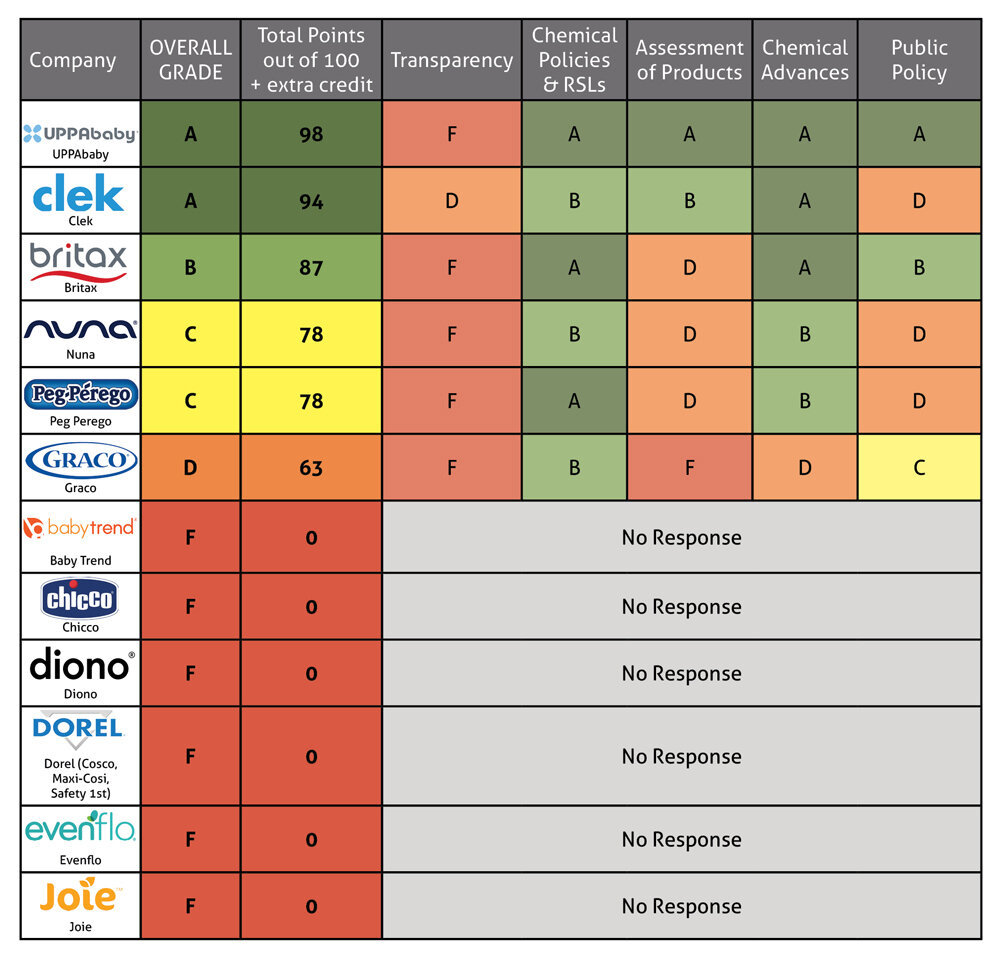July 11, 2019—Ecology Center’s Healthy Stuff program released its first-ever company ranking survey in the new report, Children’s Car Seat Chemical Policy Report Card 2019. The study surveyed 12 leading car seat companies on their corporate chemical policies and practices to help parents know which brands are most committed and transparent in their efforts towards protecting children from unnecessary toxic chemical exposures in their products. The survey found that UPPAbaby and Clek brands ranked highest, receiving an overall A letter grade. Additional brand rankings include: Britax with a B grade, Nuna and Peg Perego with a C grade, and Graco with a D grade. Due to lack of response, companies Baby Trend, Chicco, Diono, Dorel (Cosco, Maxi-Cosi, Safety 1st), Evenflo, and Joie received a letter grade of F.
The survey measured companies based on their chemical transparency, internal chemical policies, assessment of products, and public policy advocacy. Although most car seat manufacturers are making advances toward eliminating hazardous chemicals from their products, they all lack a public Restricted Substances List (RSL). Most companies do not have a public chemical policy and only a few companies were found to have a public statement on chemicals.
Children’s car seat manufacturers are not required by law to publicly reveal if hazardous chemicals are in their seats. “Transparency is key in allowing parents to make the most informed purchasing decision,” explains Melissa Cooper Sargent, Green Living Resources Director at the Ecology Center. “We urge car seat companies to be transparent with their chemicals policies by making them easily accessible to parents by posting them in a visible and searchable way on their websites.”
Chemicals found in children’s car seats often include hazardous flame retardants and fluorinated stain guards. Toxic flame retardant chemicals can harm major systems in the body, including the hormone, developmental, reproductive, neurological, and immune systems. These chemicals pose the greatest risk to babies while their organs are still developing (prenatal and postnatal). Exposures to toxic flame retardants have been associated with an array of negative health effects including reduced IQ, developmental delays, hormone disruption, reproductive harm, obesity and cancer. Fluorinated stain guards can build up in the liver and kidneys and can contribute to immune problems, thyroid disease, kidney cancer, and testicular cancer. Exposure to these chemicals in car seats can happen through inhalation, ingestion, or even skin contact.
"Because their bodies are undergoing rapid development, infants are very susceptible to the potentially harmful effect of exposure to these and other chemicals that are added to car seat textiles,” said Katie Pelch, senior scientist at the science-based research institute, The Endocrine Disruptor Exchange. “Some of these chemicals, like the fluorinated stain guards, are not easily broken down and can build up in the body. We know enough about these chemicals to be concerned about the long term health consequences and to suggest that parents take steps to limit their children's exposure when possible."
UPPAbaby and Clek are overall leaders due to their strong internal chemical policies, assessment of products, and chemical advances. However, Clek and Britax are leading the way on transparency by offering readily-accessible chemical information on their websites. Clek publicly states they have eliminated brominated and chlorinated flame retardants and they are committed to offering products free of chemicals of concern. Britax publicly states that it requires “all of its suppliers to eliminate certain flame retardants containing bromine, chlorine, or other halogens from all components used in its car seats and all other products.”
“Corporations that make car seats seat must step up and develop comprehensive safer chemicals policies to identify, eliminate, and safely substitute toxic chemicals,” said Mike Schade, Mind the Store campaign director of Safer Chemicals, Healthy Families. “While some brands like UPPAbaby and Clek have made notable progress proving that this can be done, far too many car seat brands remain serious laggards. Dangerous chemicals like toxic flame retardants and PFAS are unnecessary and have no place in our children’s products.”
The Ecology Center urges companies to develop chemical policies that specifically include all chemicals of concern and are easily accessible by the public. A model chemical policy for consideration has been provided to all companies and is publicly available.
###
Ecology Center is a non-profit environmental advocacy organization established in 1970 in Ann Arbor, Michigan. The Ecology Center develops innovative solutions for healthy people and a healthy planet in four primary areas: Environmental Health, Sustainable Food, Energy & Climate Change, and Zero Waste. The Ecology Center’s Healthy Stuff program has tested and reported on toxic chemicals in children’s car seats for over 10 years. The most recent test results and product ratings were released in December 2018 in the report, Hidden Hazards: Flame Retardants and PFAS in Children’s Car Seats. For more information about the Ecology Center, visit www.ecocenter.org and follow @Ecology_Center.


